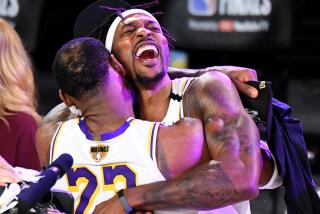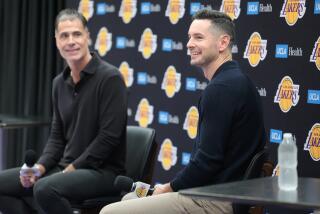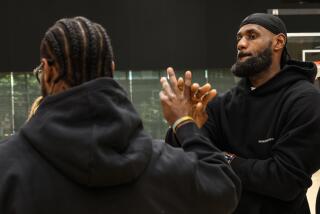Lakers report card: Front office was perfect with every signing
The Lakers entered the off-season with plenty of variables suggesting they wouldn’t significantly upgrade their roster.
They still remained the highest-spending team. They indicated they hoped to cut spending to prevent increased luxury taxes under the new labor deal. The Lakers had too many long-term contracts. Many teams wouldn’t find their bench players find desirable. Even executive Jim Buss told The Times’ T.J. Simers not to expect major changes. Though no one with the Lakers felt satisfied with two consecutive playoff exits in the Western Conference semifinals, they still maintained that the current group could still win an NBA title after having a more thorough training camp.
Yet, the Lakers still managed to do what they’ve historically done. They made big moves. They didn’t let finances get in the way of building a championship-caliber roster. The Lakers made everyone else in the league wonder how the they pulled it off. Well, plenty of that credit goes to General Manager Mitch Kupchak and Jim Buss, who receive an A+ for their work. Below is a breakdown on what made each signing great and the challenges they faced securing them.
Dwight Howard
Deal: Acquired in a four-team, 12-player deal that sent Andrew Bynum to the Philadelphia 76ers. The Lakers also sent Josh McRoberts, Christian Eyenga and first- and second-round draft picks for Chris Duhon and Earl Clark
How this move helps: This acquisition automatically makes the Lakers championship favorites. Even with Bynum’s growth, Howard has clear separation in pretty much every facet of the game. That includes defending and running the pick-and-roll, navigating double teams, staying healthy, athleticism and providing a full effort. Bynum has an edge over actual post moves, but that’s splitting hairs.
Kupchak professed that Bynum’s well-documented maturity issues weren’t a long-term concern. The Lakers would take Howard for Bynum regardless of such circumstances. Still, the Lakers no longer wonder if their star center will bring the necessary effort every night. Even with Howard’s ridiculous flip-flopping and behind-the-scenes maneuvering to leave Orlando, his play never suffered because of it. Granted, there’s still uncertainty on how he’ll recover from back surgery and if he will even re-sign next season. But the Lakers took the smart gamble in believing the winning atmosphere and Hollywood spotlight will entice Howard to stay.
The challenge in acquiring Howard: This saga didn’t last a year by accident. The Magic wanted to milk everything out of the deal, whether it was forcing teams to take unattractive contracts or giving away too many assets. Accounts say the Magic never wanted both Bynum and Pau Gasol, but there could’ve been a strong possibility that parties in a multi-trade proposal would ask the Lakers to give up both pieces. The Lakers rightfully stayed patient in waiting until they received the right proposal.
Steve Nash
Deal: Secured Nash through a sign-and-trade from the Phoenix Suns for four draft picks (two first-round, two second-round) and cash. The Lakers used their $8.9-million trade exception that stemmed from shipping Lamar Odom to Dallas to pay for Nash’s first season in his three-year, $27-million deal.
How this move helps: One of the Lakers’ biggest weaknesses at point guard became its biggest strength. Even at 38 years old, Nash remains one of the league’s top point guards because of his court vision, pick-and-roll schemes and strong outside shooting (a career 42.8% clip from three-point range). All of these variables should free up Kobe Bryant’s ball-handling responsibilities and open looks. Pau Gasol will receive more touches through pick-and-roll sequences. And the Lakers’ organization on offense should look more fluid.
The challenge in acquiring Nash. How to convince the Suns to trade him to a division rival. But the Lakers managed to do it. Nash signed because of a chance to win an NBA title and live close to his children in Phoenix. The Lakers and Nash convinced Phoenix to relent because they’d receive plenty of help to rebuild its franchise. Still, Kupchak conceded he envisioned this move happening.
Antawn Jamison
Deal: Signed for one-year at the veteran’s minimum ($1.4 million)
How this move helps: Jamison brings much-needed scoring punch to a bench that ranked nearly last in the league in points production. He’s able to play at both small forward and power forward. His locker room maturity and desire to win a ring should make him eager to do anything to fit in with the team.
The challenge in acquiring Jamison: Kupchak said signing Jamison proved just as surprising as securing Nash. That’s because Jamison earned $15.1 million last year with the Cleveland Cavaliers. Kupchak said he hadn’t even entertained pursuing Jamison because he considered it disrespectful to ask a player of his caliber to play at the veteran’s minimum. But Jamison and his agent, Arn Tellem, reached out to the Lakers, stressing he’d play for such a salary.
Jordan Hill
Deal: Two years, $7 million
How this move helps: The Lakers initially considered Hill nothing more than a throw-in as part of their efforts to be rid of Derek Fisher’s salary. But Hill became a pleasant surprise late in the season by providing consistent energy and a post presence when Bynum and Gasol needed a rest. With more time to actually absorb the Lakers’ playbook, it’s likely Hill will provide even more next season.
The challenge in acquiring Hill: Even though Hill entertained offers from the Minnesota Timberwolves, the Lakers were favored to re-sign him. Hill’s agent told The Times’ Ben Bolch that the Nash acquisition and the Lakers’ willingness to give Hill a chance last season played a large role in him returning.
Jodie Meeks
Deal: Two years, $3 million with team option on the second year. First year is worth around $1.4 million.
How this move helps: The Lakers now have a definitive backup shooting guard who can both limit Bryant’s minutes and help the team’s outside shooting. The 25-year-old Meeks has shot a career 37.1% from three-point range in his first four NBA season.
The challenge in acquiring Meeks: His agent, David Bauman, made it clear Meeks wouldn’t just accept a veteran’s minimum deal. Yet, the Lakers indicated they didn’t want to sign any players using their mini-mid-level exception worth $3 million. So both sides reached a compromise. Meeks’ first year is about $500,000 more than the player’s minimum with four years’ experience. Meanwhile, the Lakers didn’t need to dip deep into their finances to get him. Meeks acknowledged that the Lakers’ other off-season signings in Nash and Howard played a huge part in wanting to join the team.
Devin Ebanks
Deal: Qualifying offer for one-year worth a little over $1 million.
How this move helps: He only averaged four points on 41.6% shooting in 24 games last season. But the Lakers have lauded his work ethic and fundamentally sound approach. Considering Ebanks averaged 6.4 points on 47.8% shooting in 12 games as a starter, there’s enough evidence to suggest he’ll improve as his playing time increases.
The challenge in acquiring Ebanks: Not much. Ebanks wanted to play for the Lakers. But it still shows the Lakers and Ebanks had a mutual respect for each other on how they handled his free agency. He agreed to the deal on July 10, but never signed it so he could avoid getting lumped as a throw-in in one of the Lakers’ big trades. Meanwhile, the Lakers still left the qualifying offer on the table. Once the Lakers made their big moves with Nash and Howard, Ebanks quickly signed.
Darius Morris
Deal: Qualifying offer for one-year worth $940,000
How this move helps: The Lakers coaching staff liked his athleticism and work ethic even though they felt he forced the issue and looked raw during his limited playing time. The Lakers made the move at the time because they were unsure of what the point guard position would look like after Ramon Sessions opted out of his player option. But Kupchak suggested Morris may be the odd man out of a point-guard heavy roster after the Lakers acquired Duhon.
The challenge in acquiring Morris: Not much. Morris said during his exit interview that he may put a higher premium on signing with a team that would grant him more playing time. But he accepted the Lakers’ qualifying offer pretty quickly.
RELATED:
Dwight Howard’s presence gives Lakers’ ticket prices a boost
Kevin Durant, James Harden silent on Dwight Howard to Jimmy Fallon
Stan Van Gundy: Magic management more to blame than Dwight Howard
E-mail the Lakers blog at [email protected]. Follow the Lakers blog on Twitter.
More to Read
All things Lakers, all the time.
Get all the Lakers news you need in Dan Woike's weekly newsletter.
You may occasionally receive promotional content from the Los Angeles Times.






